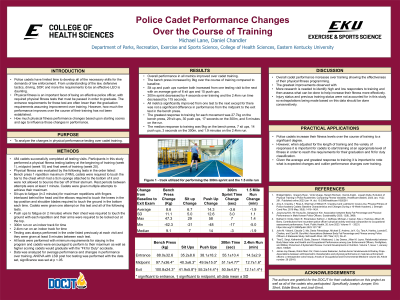Tactical Strength and Conditioning
(24) POLICE CADET PERFORMANCE CHANGES OVER THE COURSE OF TRAINING


Michael T. Lane, PhD
Professor
Eastern Kentucky University
Lexington, Kentucky, United States- DC
Daniel Chandler
Graduate Assistant
Eastern Kentucky University
Richmond, Kentucky, United States
Poster Presenter(s)
Author(s)
Introduction: Police cadets have limited time to develop all of the necessary skills for the demands of law enforcement. Physical fitness is an important facet of being an effective police officer, however, how much this fitness change over the course of their training has not been established.
Purpose: To analyze for changes in physical performance testing over cadet training.
Methods: 484 cadets successfully completed all testing visits. Participants in this study performed a physical fitness battery at the beginning of training (week 1), midpoint (week 10) and final week of training (week 20). Physical fitness was evaluated by bench press 1 repetition maximum (1RM), sit ups to fatigue (in 2 minutes), push ups to fatigue (in two minutes), 300m run and 2.4km run. Testing was always performed in that order at each visit and they were given at least 5 minutes between each test. Data was analyzed for average performance and changes in performance over training. ANOVA with LSD post hoc testing was performed with the data set, significance was set at p < .05.
Results: Overall performance in all metrics improved over cadet training. Bench press increased by 9kg over the course of training compared to baseline. Sit up and push ups number both increased from one testing visit to the next with an average gain of 6 sit ups and 15 push ups. 300m sprint decreased by 4 seconds over training and the 2.4km run time decreased by 115 seconds. All metrics significantly improved from one test to the next except for there was not a significant difference in performance from the midpoint to the exit test in the bench press. The greatest response to training for each movement was 27.7kg on the bench press, 29 sit ups, 30 push ups, 17 seconds on the 300m, and 5 minutes on the run. The median response to training was 9kg on the bench press, 7 sit ups, 14 push ups, 3 seconds on the 300m, and 1.9 minutes on the 2.4km run.
Conclusions: Overall cadet performance increases over training showing the effectiveness of their physical fitness programming. More research is needed to identify high and low responders to training and then assess what can be done to help increase their fitness more effectively.
PRACTICAL APPLICATIONS: Police cadets increase their fitness levels over the course of training to a significant degree. However, when adjusted for the length of training and the variety of responses it is important for cadets to start training at an appropriate level of fitness in order to reach the requirements for their graduation and fit for duty classification.
Acknowledgements: Instructors and Cadets at the DOCJT
